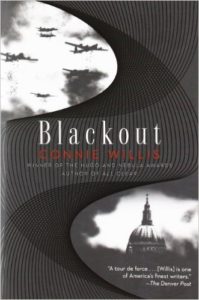Reading Connie Willis is always, sentence by sentence, a delight. Her characters are sympathetic and interesting to spend time with; conflicts usually arise from misunderstandings, or from the nature of a situation. Some few people are jerks, some are hurt and acting out, but that’s just like life, isn’t it? Willis also appears to have a deep and abiding love for Hollywood screwball comedies, and even her most serious stories have their madcap moments.
In Blackout, she returns to her loose series of tales (Doomsday Book, “Fire Watch,” To Say Nothing of the Dog) of time-traveling historians. In the middle of the twenty-first century, the practical aspects of time travel were mastered, even if not all of the theory was properly worked out, and history changed from an archival discipline to a practical one. Oxford University, as an ancient seat of learning, offers the backdrop for the segments of Blackout that take place in the future. As Blackout opens, the history department is particularly busy, with historians and technicians running hither and thither, juggling schedules, props, costumes and implants that give detailed local knowledge. The comedy of missed connections in these parts of the book is enjoyable, especially if you don’t stop to ask why characters in the Oxford of 2060 can’t simply call each other on a mobile phone.
The main action of the book follows three historians – two women and one man – who have gone back to research parts of the Second World War. Generally speaking, their work is about the heroism of everyday people. That’s a perfectly valid research agenda, and it allows Willis to do what she clearly wants to do with the novel, which is to show regular people getting on with their lives under circumstances that are increasingly trying. The historians stand in for readers, although with even more precise knowledge of upcoming events. One encounters a betting pool about the date of the end of the war; all of the “contemps” (contemporaries) expect the fighting in Europe to end within just a few months of the opening of the second front in Normandy. Another encounters a pair of very young honeymooners in the Tower of London in 1940, during the Blitz.
“They’re good luck, you know,” the girl said. “So long as there are ravens at the Tower, England can never fall.”
Which is why, then they’re all killed by a blast next month, the government will secretly dispose of the bodies and substitute new ones. …
The boy pored over the map for several moments and then said, “We could go to Westminster Abbey.”
They’re here sightseeing, Polly thought, amazed. In the middle of the Blitz.
“Or we could go to Madame Tussaud’s Waxworks,” the boy was saying, “and see Anne Boleyn and Henry VIII’s other wives.”
No, you can’t. Madam Tussaud’s was bombed on the eleventh. (p. 145)
One of the premises of Willis’ time travel stories is that historians can’t change the past in any significant way. There is something like the conservation of history that prevents them from getting close to events, called “divergence points” in the story, that would cause disruptions in the timeline. To take an example appropriate to Blackout, they cannot make the bomb plot in German headquarters on July 20, 1944 succeed; nor can they go back another decade and persuade Hindenburg to name someone else as Chancellor.
Over the course of Blackout, the characters start to question that premise. One of the historians winds up at Dunkirk, which had been regarded as a divergence point. The “drops” that should allow them to communicate with 2060s Oxford are not opening, and the retrieval teams that are standard practice for fetching historians who are late for their rendezvous with the future have not shown up. Has something dreadful happened in future Oxford? Has a historian somehow changed that past, and with it the future that they all came from? Are they all stranded in the middle of WWII?
Those are some of the questions that Blackout sets up … and then does not answer at all. The book is the first half of a longer story, Blackout/All Clear, which won the Hugo for best novel in 2011. I have only just started All Clear, which picks up right where Blackout left off. They are one 1100-page story, of which I have read a bit more than the first third, so in some ways this is a premature evaluation.
As far as that goes, I confess that I am having trouble worrying about the threat of having changed the past. The historian who is most concerned – Michael, who wound up at Dunkirk – ties himself up in knots thinking about what repercussions his actions or inactions might have down the line. It’s a recipe for a character unable to do anything, and thus uninteresting. The threat of derailing the train of history also feels contrived, as if Willis needs something to worry the historians, to put them in danger beyond what the contemps face and to drive the narrative while she would be happy just to relate the tales of the era. It’s possible that something in All Clear will upend the applecart (Willis did something like that in Doomsday Book and even more so in Passages) and make that worry real, but unless and until that happens, I would have been content for her to just tell the stories of regular people during the war that have so clearly captured her heart and imagination.


2 pings
[…] « Blackout by Connie Willis […]
[…] Willis won another Hugo in 2011 for a pair of novels about time travel to England in World War II, Blackout/All Clear. Of her work published since then, I have only read […]